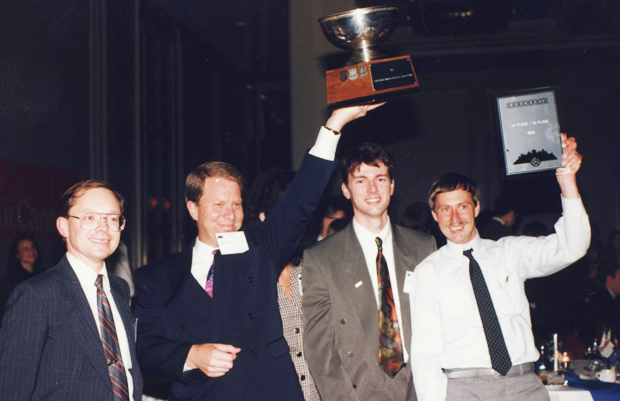35 years of ‘real world’ business challenges
 The University of Otago in New Zealand won the case competition in 1992, when it was opened up internationally. Just to prove it wasn't a fluke, they won again in 1993. | Photo courtesy of Cleveland Patterson
The University of Otago in New Zealand won the case competition in 1992, when it was opened up internationally. Just to prove it wasn't a fluke, they won again in 1993. | Photo courtesy of Cleveland Patterson
In January, the John Molson MBA International Case Competition (ICC) hit a milestone, when Concordia hosted the 35th edition of the globally recognized contest.
To mark this year’s anniversary, Cleveland Patterson, professor emeritus and previous faculty advisor for the competition, recently endowed an award, which will be given to each edition’s student organizers going forward “in recognition of their impressive, but often overlooked accomplishments.”
Without a doubt, organizers of this year’s 35th anniversary showdown, and previous editions, have bragging rights.
“No other case competition worldwide even comes close to the number of teams we host, number of countries represented, judges and business personnel we connect, volunteer participation and so on,” says Nidish Pc, an MBA student and 2016 executive organizer.
“There are even universities who have a formal case competition class incorporated into their curriculum to prepare for the John Molson MBA ICC,” he says. “That is the standard that we have set in the past 35 years.”
The 2016 competition, held from January 3 to 8, attracted 36 teams of four students, representing 19 countries across the globe. Heinrich Heine University Düsseldorf took home the Concordia Cup and $10,000 in prize money.
The students in charge of organizing the competition work with an academic advisor throughout the year, and they also report to a Board of Directors as part of their “real world” experience.
A new crew is already planning for next year’s 36th edition.
“There is a big challenge for 2017 because we’re moving from Fairmont The Queen Elizabeth to Hotel Bonaventure,” says MBA student Mohamed Saleh, an executive organizer in charge of hotel, budget, tech and logistics. “We meet often, but starting in April, it’s like a full-time job.”
The other executive organizers for 2017 are Suha Quraini, Aali Arif Malik and Valerie Consolante.
35 years: a faculty advisor remembers
To provide some context for this year’s anniversary of the John Molson MBA Case Competition, Patterson offered to take us back to its humble beginnings.
In 1981, when I was chair of the Department of Finance, I was visited in my office by a young assistant professor, Ken Reiner, and two MBA students. The two students, Nora Kelly and Annette Wilde, had an idea: they wanted to organize and launch a regional MBA Case Competition, as it was called then, among several local universities, sponsored by Concordia.
They had worked out the basic logistics and obtained enthusiastic agreement from four other Quebec business schools, in addition to a team from Concordia, and were keen to go. All they needed was support from the faculty and the university. Could I help?
It was a great idea and I proceeded to sell the proposal to the dean and faculty council while Nora and Annette got on with the daunting tasks of recruiting judges, getting sponsors, reserving venues, liaising with the other teams, selecting cases and a myriad of other logistical challenges.
The first case competition was a huge success and was won jointly by McGill and UQAM. There was unanimous agreement in the faculty that it should be repeated. Ken Reiner left at the end of the year and I agreed to take on the role of faculty advisor. Several other faculty members — notably Pierre Brunet, Bill Taylor and Bakr Ibrahim — also participated with enthusiasm.
Nora and Annette insisted from the outset that the competition should be “real world,” not an academic exercise, and they recruited an impressive group of senior executives from such firms as Alcan, Pratt & Whitney, the big banks and other major Montreal companies to be judges.
In the four years following the initial Quebec version’s success, the organizers expanded the competition across Canada.
Triumphs by smaller schools with big hearts
In 1992, when I was director of the MBA program, the decision was made to expand the competition internationally. This was a major step that required a radical restructuring of the competition format to accommodate 24 teams, and later 36, accompanied by an exponential increase in organizational complexity.
One of the first questions was, “who do we invite?” I suggested the University of Otago in New Zealand, where I had recently held a visiting chair and taught in their small but very selective MBA program.
“Who?” asked the dean. “Never heard of them.”
“You will,” I replied. They came, and they won. The Kiwis also won a prize for being the best party animals, voted by their competitors. To prove it wasn’t a fluke, they came and won again in 1993. This pattern, of triumphs by smaller schools with big hearts and intense preparation, has been common in the 35-year history of the competition.
The quarter century since the newly named International Case Competition was launched in 1992, Nora and Annette’s “real world” concept has grown to include 270 executives acting as judges in 2016, and almost 40 corporate sponsors.
I have been particularly impressed with the work of the student organizers over the past 35 years. Beginning with Annette and Nora, more than 100 Concordia MBA students have taken on this demanding role since 1982.
In recognition of their impressive, but often overlooked accomplishments, I recently endowed the Cleveland Patterson 35th Anniversary Award to be given to each year’s organizers for the next 35 years and beyond.
Witnessing the development of the competition from its modest beginnings has given me great satisfaction, and I wish JMSB and its student representatives continuing success in the future.
Keep up with the John Molson MBA International Case Competition throughout the year.




